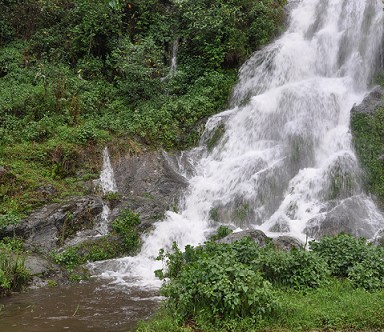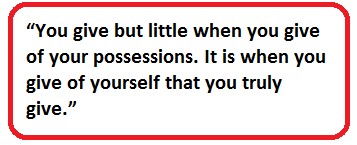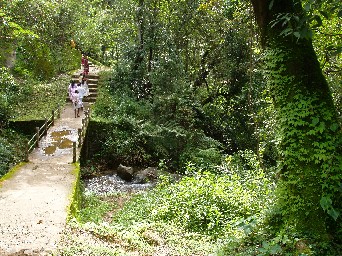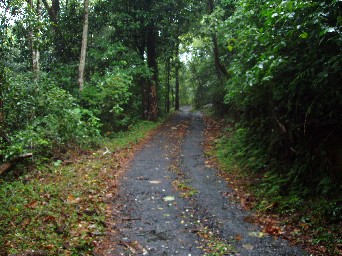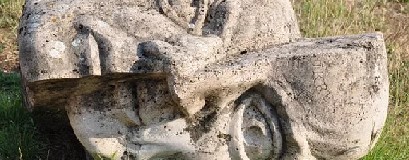Some 75 km northwest of Kochi – Kerala’s bustling seaport in Southern India lies the trading town of Chalakudy. And a short 5 km away flows the river that carries its name. Go another few km and you are at the Athirampally falls. Here, water gushes over a large rocky knoll in white, effervescent waves. As you get closer, you feel the wetness; then you are surrounded by a fine mist, cool and bracing against your skin.
If you are a nature lover, be here at the break of dawn – and give yourself up to the magic in the air. You’ll find yourself being led downstream, as if by an unseen force, to an enchanting spot where, the river seems to bare its soul.
Beneath a painted sky, you’ll find the Chalakudi River overwhelmingly dominating the scene. Neither the overgrown trees lining the banks nor the lush vegetation all around seem to diminish its arresting presence. In its gurgling flow, you sense a certain indescribable quality a tranquil gentility, suffused with a vibrant energy.
This September morning – after a fairly active monsoon the river is swollen and flows at a crisp pace here, sweeping majestically through a bend upstream, and about seventy meandering miles from its source in the higher reaches of the Sholayar ranges. Scattered rocks, sculpted into round domes by the constantly flowing water, dam up the flow momentarily, creating small cascades – curving sheets of water that plunge over them. Billows of spray shoot into the morning air. As the sun climbs up, shafts of orange-yellow light filter through the canopy overhead and blobs of light dance on the rippling surface like prancing doe.
Close to the bank, in the lee of a rocky mole, fallen leaves rollick in miniature whirlpools. And a pair of terns, eager for breakfast, finds it a perfect feeding ground. Vigilant and watchful, they catch silvery fish that flip into the air, swallowing them swiftly with few jerks of their upturned head. Kingfishers, adopting a different strategy, sweep down from limbs of trees leaning delectably into the water. Diving into the river, they come up abruptly with a quivering small fry clamped between their pointed beaks.
Life thrived here, nurtured and sustained by the river. It is as if every living thing here is rejoicing and celebrating the gift of a vibrant life nourished and enriched not only by the waters of the river but also by the sun, the winds, the very earth; in fact all the elements of nature combining in a benevolent effort, striving towards one aim – uphold and sustain the magic called life. And here, you feel connected to it. Here, you glimpse the soul of the river.
About 12 km upstream, you come to Vazhachal another waterfall, where, in sylvan surroundings, water plunges about 80 feet in white roiling froth. A body of water any where a lake, river, stream or the sea has a certain quality that touches your finer sensibilities, your deeper self. That feeling is inescapable here.
From Vazhachal, if you drive upstream, eastward, you climb further into the Sholayar ranges of the luxuriant Western Ghats. “Nearly forty rivers spring from the Western Ghats and flow into the Arabian Sea or into back waters,” says Cherian, the forest officer at an outpost on the way. Indeed, the land is blessed with a surfeit of water. And once the rains arrive, the earth is soaked, the overflow running into channels and streams where the roiling water tumbles in an effusive surge through hills and dales to join the numerous rivers or the labyrinth of backwaters along the long coast. A narrow strip of land fed by 40 odd rivers and cradled by the Arabian Sea on one side and the mountains of the Western Ghats on the other.
That sums up the geography of this swath of land called Kerala. It also explains why its greenery is so rich, its flora so vibrant.
Cruising down the smooth highway, you’ll find it hard to keep your eyes on the asphalt ribbon stretching in front, hugging the undulating landscape, and at the same time savour the visual feast around you. As the road sweeps uphill, you begin to feel light-hearted; your spirits buoyant… then you realise you owe it perhaps to the oxygen rich air in the surrounding forest. But if you enquire about wildlife here, you’ll get a shrug from the locals meaning there’s not much wildlife on view except for giant flying squirrels, sambar, bison and occasional sightings of elephants, found watering at the river banks, usually in herds of five or six. But there’s a thriving avian population here nonetheless, and the pick of the lot is the state bird: the great Indian hornbill. Winding your way up the serpentine road you sense a magic in the air and feel compelled to pull over and hop out of your car. A gust of wind ripples through the surrounding woods making the bamboo groves groan and the tall trees whisper. Soothed by the gentle breeze and surrounded by pristine nature, you sense all tension ease from your body as you eavesdrop on a woodpecker busy building his home or peek into the jungle and find bare barks and snaking roots of gnarled old trees coated with lichens and moss. The dappled forest floor is covered in a blanket of fallen leaves dotted with underbrush. The scent of raw earth, green vegetation and flowing water assails your already heightened senses. Positive, joyous vibes, a kind of rhapsody envelops you. The feeling is surreal almost mystical.
Sometimes you find no habitation for miles and the only sounds are the birdcalls and the whistling of the wind. Balan Nair, the greying but lanky and moustachioed owner of a quaintly charming inn by the roadside is quite knowledgeable about the Ghats. “The Western Ghats,” he says, “is recognized worldwide as a biodiversity hotspot. It is home to threatened flora and fauna. Ignorance and man’s greed have together destroyed a lot of its richness. Fortunately, some conservation efforts are now on.” And having partaken of the richness of this land, you hope that these efforts bear fruit.
The meandering rivers, delightful waterfalls and the cool mountain air, all make for an unforgettable experience another facet of Kerala.



